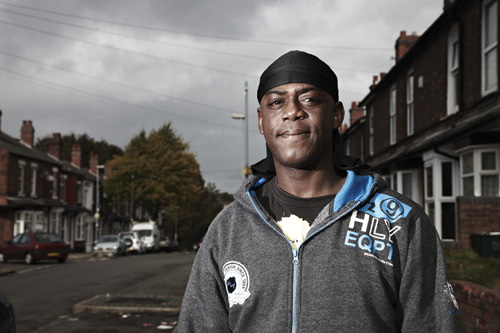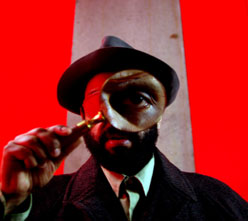
This article is a preview from the Spring 2014 issue of New Humanist magazine. You can subscribe here.
It’s not exactly clear why Channel 4’s Benefits Street (broadcast in January and February 2014) caused such a furore. It wasn’t the most obviously exploitative of the many programmes about the unemployed and those on benefits. Yet something about this series, which followed the residents of James Turner Street in Birmingham, touched a nerve. It was immediately pressed into ideological service by the Right, fitted into a pre-existing story about the “need to reform the welfare state”. The Daily Mail’s Richard Littlejohn quickly inserted some of the series’s participants into his phobic delirium. For most of those on the Left, however, it was business as usual. For Owen Jones, author of the book Chavs, it was yet another case of the demonisation of the working class. For Ben Walters, writing on the blog Not Television, it was an example of Thatcherite documentary, while for the film-maker Katharine Round, writing for the Huffington Post, it was a depressing example of the way in which documentaries were being used to “kick those without a voice”.
In terms of its content, Benefits Street wasn’t all reactionary. Its somewhat mealy-mouthed claim to be about “community” rather than benefits wasn’t entirely false. Even in the first episode – which sensationistically dwelled on crime – there was still some emphasis on camaraderie and solidarity amongst the poor on the street. The second episode, which centred on desperate Romanians seeking work, was certainly sympathetic to the immigrants’ plight, and might even have done something to challenge the dominant media narrative about East Europeans “coming to steal our jobs and our benefits”. And by the third and fourth episodes sensation had largely given way to the inertia and radically contracted horizons of life on benefits. A small taste of this ought to have been enough to disabuse anyone of the notion that life on benefits is easy – but, since this belief is supported by relentless media propaganda, it isn’t likely to be given up any time soon.
Still, Benefits Street is undoubtedly part of a disingenuous trend in documentary making. Writing last year for the journal The Sociological Imagination, Tracy Jensen predicted a “summer of poverty porn”, citing such programmes as How To Get A Council House, Why Don’t You Speak English?, Benefits Britain 1949 (all Channel 4) and We All Pay Your Benefits (BBC1). Writing of the latter, Jensen argued that despite occasional moments of sympathy towards benefits claimants, the “programme’s ideological message was clear; worth comes from paid work and not from childrearing or volunteering; unemployment is a problem of will or determination and not of structural obstacles; and social security itself generates the ‘problem’ of welfare dependence.”
Ultimately, Benefits Street fitted the same formula, in which intermittent sympathy for the poor and unemployed was used to season an otherwise crude reproduction of negative stereotypes. Then there is the perennial question of the exploitation of those who were filmed. Some – including residents of James Turner Street itself – objected to Benefits Street because they claimed that the programme’s producers had misrepresented what the series was actually going to be about. The residents weren’t told, for instance, that the series was to be given such a provocative and loaded title (the programme makers claimed that this was a last-minute decision, but I’m not sure how believable that is).
The deep problem with programmes like Benefits Street lies more in their form than in their content. A decade ago, the academic John Corner argued that reality TV had led to a genre of “post-documentary” television, in which documentary elements were merged with game-shows, makeover programmes and other entertainment forms. Now we are in the era of post-reality TV documentary, a much more pernicious genre. Even the most credulous viewer of reality TV could hardly fail to be aware of its constructedness, with participants worrying and complaining about how they were “portrayed”, and viewers quickly becoming familiar with the way narrative was produced by editing. (Partly this was because shows like Big Brother gave viewers access to the unedited footage, to the longueurs and the shapelessness of a quotidian time prior to its moulding into narrative.) Such reflexivity is largely absent from post-reality TV documentary – this genre uses many of the techniques from reality TV, but presents them with the simulated sobriety of documentary rather than with the winking, heavily made-up face of entertainment. That’s not to say that post-reality TV documentary is entirely straight-laced; no – one of its defining characteristics is a certain humour and lightness. But it doesn’t want to be positioned as entertainment in the way that reality TV was.
In their important study Reacting To Reality Television: Performance, Audience And Value, Beverley Skeggs and Helen Wood argue that much reality TV posits an implied bourgeois gaze, which judges working-class participants as lacking, by comparison with the middle class. Moreover, this lack is understood in heavily moralised terms; it isn’t to be explained by the working class’s lack of resources or opportunities, but by a deficit in will and effort. This implied perspective – seldom actually stated, but informing the whole way in which programmes are produced – is typical of the post-reality
TV documentary.
This moralistic framing was at work in Benefits Street. It did almost nothing to contextualise what it showed. There was barely any discussion of why the participants had ended up on benefits, and no mention of the social causes of unemployment, just as there was no interrogation of the political agendas driving the focus on those claiming benefits, nor any examination of austerity as a political project. Post-reality TV documentary projects a radically depoliticised world of individuals and their intimacies. In Benefits Street, we were told that benefits were cut, but this was treated like some natural disaster, an act of God rather than the consequence of a political decision.
In many respects, post-reality TV documentary – like reality TV before it – goes out of its way to conceal the class differences between those who are making the programmes and those who feature in them. Like tabloid newspapers, the scripts impersonate a working-class vernacular. Typically, the voice-over plays an important role in this bid to present the programme to working-class viewers as if it has been produced by a group of peers. The voice-over will not now be the voice of the actual programme makers. If they are heard at all, these voices will only be heard in the off-screen prompts and questions put to the working-class participants. In the case of Benefits Street, the voice-over was performed by actor Tony Hirst, who has recently left the Coronation Street cast. Hirst’s accent is working class, northern; his tone – perfectly in keeping with the supposedly “serious yet humorous” register of the post-reality TV documentary – is no-nonsense and wry. Tellingly, it was reported that the voice-over had been first offered to Brummie comedian Frank Skinner, who turned it down.
The use of voice-overs by actors or comedians from working-class backgrounds not only obfuscates the class origins of those making the programme; it also bolsters the programme’s claims to authenticity. In addition, and perhaps most significantly, the voice-over is part of a strategy that conceals the fact that the material is being framed in a particular way. In previous, more essayistic forms of documentary, when the person writing the script would also provide the voice-over, and might appear on camera, it was clearer both that a particular case was being made and who was making it. In the absence of a journalist or a programme-maker explicitly taking responsibility for any argument, viewers are invited to classify what they are seeing as the truth, pure and unmediated: this, we are induced to believe, is just real people, being themselves, and the refusal or failure to make any explicit argument allows dominant ideology – which the programme doesn’t acknowledge, still less challenge – to step in.
It’s a mark of how bad Channel 4’s programming now is that Benefits Street would probably count as one of its more serious recent attempts at documentary. If you want to measure the catastrophic impact of neoliberalism on British culture, then there’s no better example than Channel 4. A channel that began with programming that included European art films, serious philosophy discussion programmes and politically sophisticated documentaries has now degenerated into depths so embarrassingly hucksterish and craven that they are beyond parody. This is a channel which still allows Tory toffs like Kirstie Allsopp to front programmes that act as if it is normal for house-buyers to have budgets of a million pounds; a channel that cries crocodile tears over mental illness and other forms of extreme misfortune as a thin pretext for ruthlessly exploiting them. I’d like to think this decline isn’t irreversible, but there aren’t many reasons for hope at the moment.

